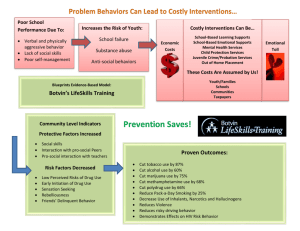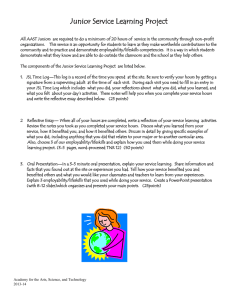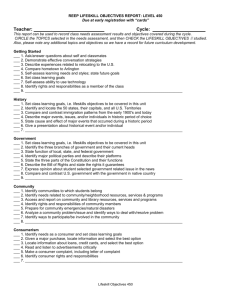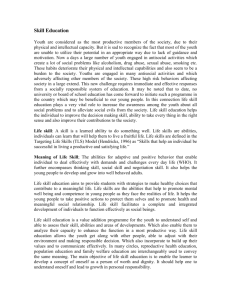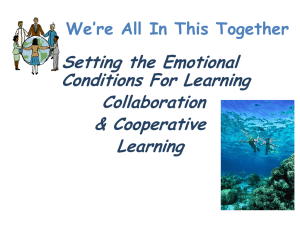Investors in People
advertisement
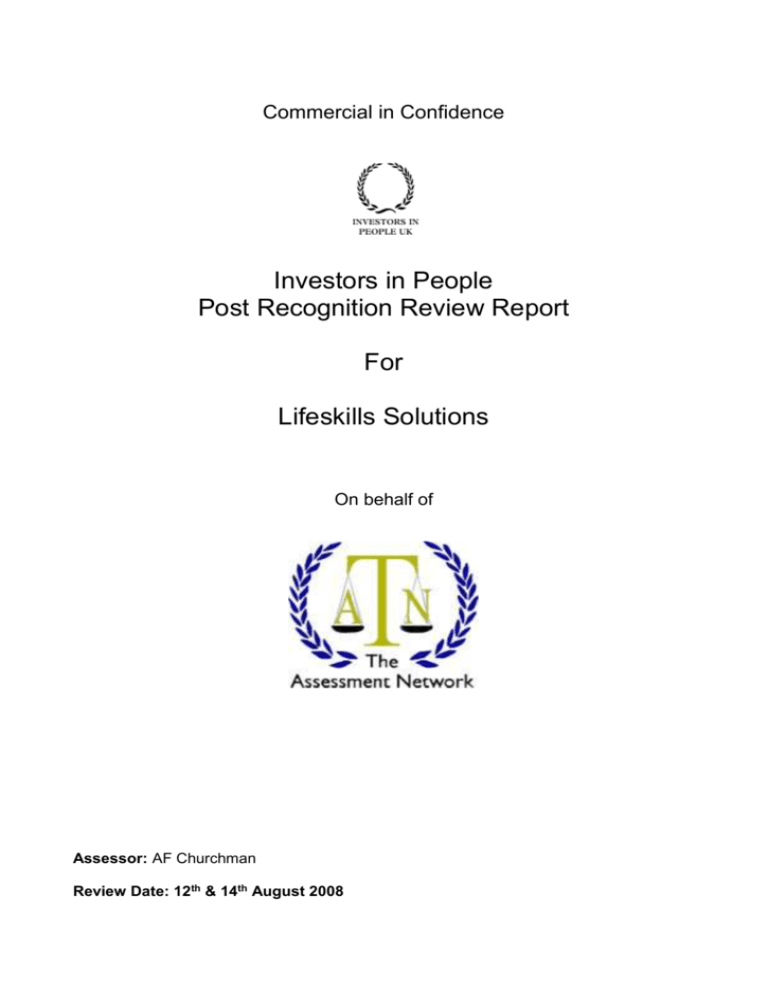
Commercial in Confidence Investors in People Post Recognition Review Report For Lifeskills Solutions On behalf of Assessor: AF Churchman Review Date: 12th & 14th August 2008 Commercial in Confidence Lifeskills Solutions Ltd Contents 1. Introduction Page 2 2 Changes / Progress since last Investors in People Assessment Page 2 3. Review and Client Objectives Page 2 4. Assessment Plan Page 3 5 Executive Summary – Strengths and Business Improvement Suggestions Page 3 6. General Findings Relating to the Principles of the Investors in People Standard Page 6 7. Conclusion Page 10 8. Next Review Page 10 9. Quality Assurance Page 10 Appendix I – Assessment Outcomes Matrix Appendix II – Assessment Plan Review Date: 11th & 14th Aug 2008 Project Number: 08/0648 Page 1 Commercial in Confidence Lifeskills Solutions Ltd 1. Introduction Lifeskills Solutions achieved IiP accreditation in April 2005. Since then there has been significant growth including the opening of three new offices. Although still a key training provider, the range of training and education has changed and now includes, for example, retail, construction, hair and beauty and functional skills. Gaining accreditation and funding from projects including E2E, Train to Gain and apprenticeships, Lifeskills continues to grow and develop by continually looking at needs at a local area level. During the past three year Lifeskills has grown in staff numbers, locations and provision. They are totally committed to providing development opportunities for staff and students whilst at the same time being aware and involved within their respective communities. The facilities and functions provided by Lifeskills are reviewed and assessed by various bodies and they consistently and deservedly receive positive feedback. 2 Changes and Progress Since Last Investors in People Assessment The previous assessment identified much strength within Lifeskills, which resulted in the Recognition Panel awarding Lifeskills with recognition against the IiP standard. There were also several areas identified as ‘potential areas for development’ these included the following: Recommendation Review staff attitudes Conduct quarterly staff reviews Display KPI’s Conduct senior staff appraisals Review management skills Implement evaluation strategy Action taken Staff surveys conducted Now a regular feature of staff development Done at every opportunity Implemented 360 degree review Using NVQ levels 4 and 5 Built into quarterly staff review exercise 3. Assessment and Client Objectives Review consistency of approach throughout Lifeskills Solutions. Lifeskills is very much a growing organisation currently operating from 5 sites and it is important that each site operates equally and all members of staff see the benefits from being an employee of Lifeskills. Review Date: 11th & 14th Aug 2008 Project Number: 08/0648 Page 2 Commercial in Confidence Lifeskills Solutions Ltd 4. Assessment Plan Refer to assessment plan in Appendix II. Additional supporting evidence collected /examined. Previous IiP Report Business Strategy document Staff Newsletters Full staff list Certificates of achievement Staff survey results 5. Executive Summary The key findings of the assessment indicated that Lifeskills Solutions Ltd meet the evidence requirements of the current version of the National Investors in People Standard. The below summary represents the assessment findings within the context of identified strengths and suggestions for further development: 5.1. Key Strengths The Strategic Plan identifying specifically the future needs of Lifeskills The clear vision of “We aim to be recognised as one of the leading learning providers in the UK for youth and adult programmes by 2012 The Mission statement identifying the purpose and culture of Lifeskills A summary of the Key Objectives of Lifeskills so as to give clear direction for staff Staff involvement in and understanding of Lifeskills Key Objectives The Specific, Measurable, Achievable, Realistic and Measurable (SMART) approach to objective setting The planning and delivery of staff learning and development activities including, for example, internal coaching, mentoring, observing, feedback, attending courses, conferences and seminars The understanding of the key responsibilities of line managers Review Date: 11th & 14th Aug 2008 Project Number: 08/0648 Page 3 Commercial in Confidence Lifeskills Solutions Ltd Key Strengths continued The commitment to developing people in-house and giving the opportunity to staff members to develop their skills and position within Lifeskills Regular opportunity through the staff review programme to discuss performance and development needs Strong evidence of following up on staff ideas, i.e. introducing learning facilities for adults in basic construction skills and providing facilities for pre-16 year olds having been excluded or about to be excluded from school Regular recognition of performance at individual, team and organisational level The support given to staff celebration and social events Staff achievement of National qualifications The winning of Business Awards i.e. Essex Business Award for Staff Training and Development The encouragement given to staff to share ideas on improvement The follow up and support given to staff ideas i.e. the new Nail and Beauty Department Positive communication strategies to ensure cascading of information, upward communication and lateral communication where the current focus is on sharing good practice Conducting of staff surveys to benchmark staff views and opinions on employment within Lifeskills Good feeling of achievement demonstrated by all of those interviewed Positive feedback on culture of life skills i.e. friendly, supportive, inclusive and providing an opportunity to develop skills and grow with the company Review Date: 11th & 14th Aug 2008 Project Number: 08/0648 Page 4 Commercial in Confidence Lifeskills Solutions Ltd 5.2. Business Improvement Suggestions (Linked to the Investors in People Standard) The current planning strategy might only be improved by more specific upward contribution. Staff do feel involved through various formats including, for example, team meetings, staff reviews and business review meetings. From the success of your SWOT exercise you could address the outcomes, i.e. Communication, Staffing (numbers, qualifications, turnover etc), bidding for contracts and quality of service by conducting further SWOT exercises with selected staff members Managers are aware of their responsibilities, as are staff members. People management skills have been developed through both experience and following recognised management programmes. You might now consider introducing clear expectations of Lifeskills managers in terms of skills, knowledge and behaviours Those new to the organisation have received an induction to their respective positions. As a growing organisation it will be important to achieve consistency in this area whereby staff feel they are fully inducted before participating in work activities Several groups within Lifeskills meet bi-monthly. This is an opportunity for staff from different sites to meet, share good practice and be brought up to speed with company developments. You might want to consider including within these meetings specific discussions around the following areas which have been suggested by, for example, work placement officers and tutors: Standardising schemes of work, relationships between tutors and staff, pupil behaviour and learner data 5.3. Additional Objectives Feedback All of the issues raised in the assessment and subsequently in this report reflect the views and opinions help by members of staff from all sites of Lifeskills. Through one to one interviews and telephone calls to staff at offices not visited it is clear that there is consistency in all staff development activities. Review Date: 11th & 14th Aug 2008 Project Number: 08/0648 Page 5 Commercial in Confidence Lifeskills Solutions Ltd 6. General Findings Relating to the Principles of the Investors in People Standard Principle One – Developing Strategies to Improve the Performance of the Organisation COMMENTS IN RELATION TO The strategies for improving performance Strategies for learning and development Strategies for managing people Strategies for leadership and management Life Skills has a detailed Strategic Plan outlining performance for a two-year period and formally reviewed on an annual basis. The plan refers to finance, increased business, new businesses, expansion within geographical areas and office premises. Staff have been made aware of details contained within the Strategic Plans through whole staff meetings. Senior management stated, “Strategies for improving performance start at the planning process” and explained how appraisals, mandatory training, individual development plans all contribute to business improvement. Managers explained, “It is always our aim to provide the best we can for all of the people we provide training for. To achieve this we need to be focused on staff development and providing quality service. Our Aims and Objectives have been developed to satisfy these key requirements.” Specific strategies for improvement are contained within the Strategic Plan include for example: To earner progression rate to X% For X% of leavers to achieve a qualification For X% of apprentices to achieve a framework and X% of learners to achieve an NVQ To meet and exceed the requirements of external authorities Learning and development as described by one member of staff, “My development needs were planned for me during my induction. Since then I have attended courses covering dealing with young people, understanding individual assessment cycles, interviewing techniques, CV writing and First Aid. All of these courses are part of the training plan.” Managers produce the Staff Training Plan in line with the Business Plan ensuring compatibility between business needs and learning activities. Managers explained, “We have been able to provide a mix of development opportunities for the team including external training to national qualifications and internal development through planned coaching. Both have been of equal benefit.” Review Date: 11th & 14th Aug 2008 Project Number: 08/0648 Page 6 Commercial in Confidence Lifeskills Solutions Ltd Developing Strategies to Improve the Performance of the Organisation There is now a senior manager responsible for all areas of staff development. This has resulted in a more planned and focused approach to staff learning and development activities. Using feedback from staff reviews and appraisals a complete picture of staff requirements is available. Strategies for leadership and management are again considered as part of the business planning exercise to ensure those with current or potential management responsibilities will receive appropriate development opportunities. The following have been identified as management behaviours: Being approachable Being a good listener Being proactive in the work place Involving staff in the decision making process Managing staff meetings Dealing with poor performance Giving positive recognition Development has been provided to line managers in these key areas. All training in these areas to date has been positive. Managers do suggest that further training in the area of ‘dealing with poor performance’ would be of benefit. Review Date: 11th & 14th Aug 2008 Project Number: 08/0648 Page 7 Commercial in Confidence Lifeskills Solutions Ltd Principle Two – Taking Action to Improve the Performance of the Organisation COMMENTS IN RELATION TO The effectiveness of leadership and management Recognising and valuing contribution Encouraging ownership and responsibility The effectiveness of learning and development Staff views and opinions of their managers and, in particular, their effectiveness in leading and managing were consistently positive. One member of staff explained, “My manager is great, she is always supportive and understanding. She has encouraged my development and recently supported me through my NVQ course. Another member of staff explained, “My manager keeps us informed with what is happening at head office. She arranges regular team meetings where we discuss local needs and the bigger picture.” The senior manager explained, “It is very important to us that staff feel their contribution is valued. At times, we work with difficult situations. We feel it is important to be aware of these and make every effort to give positive feedback.” Again members of staff are very positive regarding their managers’ diligence in ensuring recognition is given. One member of staff explained, “My manager always says thank you. We did have a situation recently where I had to stay on for a couple of hours after my normal time. My manager quickly arranged for me to take some time off to compensate for it.” Another member of staff mentioned, “I recently achieved an NVQ qualification and my manager was the first to congratulate me.” Members of staff feel comfortable with taking responsibility. One member of staff explained, “We work closely with a range of young people who have to be dealt with differently at different times. We always have to make decisions and take responsibility. It is good to know that managers will always support what we do.” Staff development is seen to be important so as to demonstrate consistency throughout the team. Learning and development continually takes place. This includes, for example, coaching, lesson observations, team meetings and one to one mentoring. Managers and staff describe all learning as important and say, “it enables staff to have the confidence and skill to deal with situations as they arise. We are working with young people who have specific wants and needs and it is our responsibility to ensure they get an opportunity to develop to their full potential. Without the support and training we get we could meet these obligations. ” Review Date: 11th & 14th Aug 2008 Project Number: 08/0648 Page 8 Commercial in Confidence Lifeskills Solutions Ltd Principle Three – Evaluating the Impact on the Performance of the Organisation COMMENTS IN RELATION TO The impact of learning and development on performance Continuous improvement of the approach to managing and developing people The impact of learning and development is measured both internally and externally. Internally all staff development activities are measured against either predetermined expectations or NVQ levels. External training is always followed up with a discussion during an appropriate staff meeting to, as one member of staff explained, “Share new ideas and practices. It is not practical for us all to attend a training session. Feedback during a team meeting is equally effective.” The managers of Lifeskills like to encourage both external training and national accreditation of training explaining, “this gives members of staff an opportunity to share good practice with colleagues outside of their immediate workplace.” Staff view on continuous improvement is again positive. One member of staff explained, “There is a positive view on learning within Lifeskills. We have the conventional courses we need to attend but then we also get an opportunity to participate on specific courses appropriate to individual needs. I recently attended a programme called Lexion which has helped me support learners with dyslexia.” It was clear that everyone interviewed had a clear understanding of the organisational priorities and was able to discuss the contribution made. Different members of staff explained how they had received training in, for example, management development, IT, conducting appraisals and assessing students. Staff explained how learning and development activities were reviewed at the 1:1 meetings with their line managers. Senior managers explained, “It is important for us to measure the impact of learning and development activities. Currently we do this through having staff complete course evaluation sheets. This is followed by discussion regarding the impact of learning and development at planned 1:1 meetings.” Review Date: 11th & 14th Aug 2008 Project Number: 08/0648 Page 9 Commercial in Confidence Lifeskills Solutions Ltd 7. Conclusion Having conducted the review in accordance with Investors in People UK and The Assessment Network’s guidelines, I am pleased to confirm that Lifeskills Solutions continues to be recognised as an Investor in People. I would like to thank all the staff involved in the assessment particularly those who came in to be interviewed. I would also like to congratulate the managers for their commitment to staff and business development though people. 8. Next Review Recognition as an Investor in People is subject to reviews against the Investors in People Standard every three years. Therefore Lifeskills Solutions Ltd will be required to be assessed no later than 14th August 2011 although it is entirely possible to be reviewed prior to this date. For guidance in respect of future Investors in People review options please contact The Assessment Network on 01480 479 222. 9. Quality Assurance The Assessment Network Ltd is responsible for the Quality Assurance of this assessment and will invite a representative from Lifeskills Solutions Ltd to take part in a Quality Assurance Questionnaire. This questionnaire was devised and developed by Investors in People UK, with the objective of receiving client feedback in order to provide for a consistent approach to the assessment and recognition process. Further details will be forwarded by The Assessment Network Ltd in due course. Signed: ………………………………………… Review Date: 11th & 14th Aug 2008 10 Project Number: 08/0648 Date: Page Commercial in Confidence Lifeskills Solutions Ltd APPENDIX I REVIEW OUTCOMES MATRIX Evidence Requirements Met (Y/N) STRATEGIES AND PLANS The strategy for improving the performance of the organisation The strategy for learning and development Strategies for managing people Evidence Requirements Not Met (List) Y Y Y Strategies for leadership and management TAKING ACTION The effectiveness of managers Y Recognising and valuing people’s contribution Involvement and ownership Y Y The effectiveness of learning and development Y CONTINUOUS IMPROVEMENT Performance improvement as a result of investment in people Continually improving the way people are managed and developed Review Date: 11th & 14th Aug 2008 11 Y Y Project Number: 08/0648 Page Commercial in Confidence Lifeskills Solutions Ltd APPENDIX II THE ASSESSMENT NETWORK LIMITED ASSESSMENT PLAN Assessor: AF Churchman Project reference: 08/0648 Client: Life Skills Solutions Size of organisation: 70 Number of sites: 5 Date assessment plan submitted: 30/07/08 Assessment type: Review On site dates: 12th & 13th Aug 08 Scoping size: 70 Number of sites included within interview sample either by telephone or visit: 5 Number of sites in scope: 5 Telephone: Job Role/Title Directors Centre Managers Assessors Administrators Internal Verifier Tutors Work Placement Officers Others Scoping Rationale Number in To be scope interviewed 2 2 6 3 11 2 11 2 2 1 18 5 6 2 14 3 70 Totals Number of 1:1 interviews Number of group interviews Number of telephone interviews Additional client specific objectives (e.g. how the assessment will add value for the client.) 20 16 2 6 3 On site: 2 Percentage 100 50 18 18 50 28 33 21 By exception note if p/time 1 by phone 1 by phone 3 by phone 1 by phone 28 Relevant / useful information for consideration. (e.g. change to organisation structure, new IIP Champion etc.) Review Date: 11th & 14th Aug 2008 12 Project Number: 08/0648 Page
